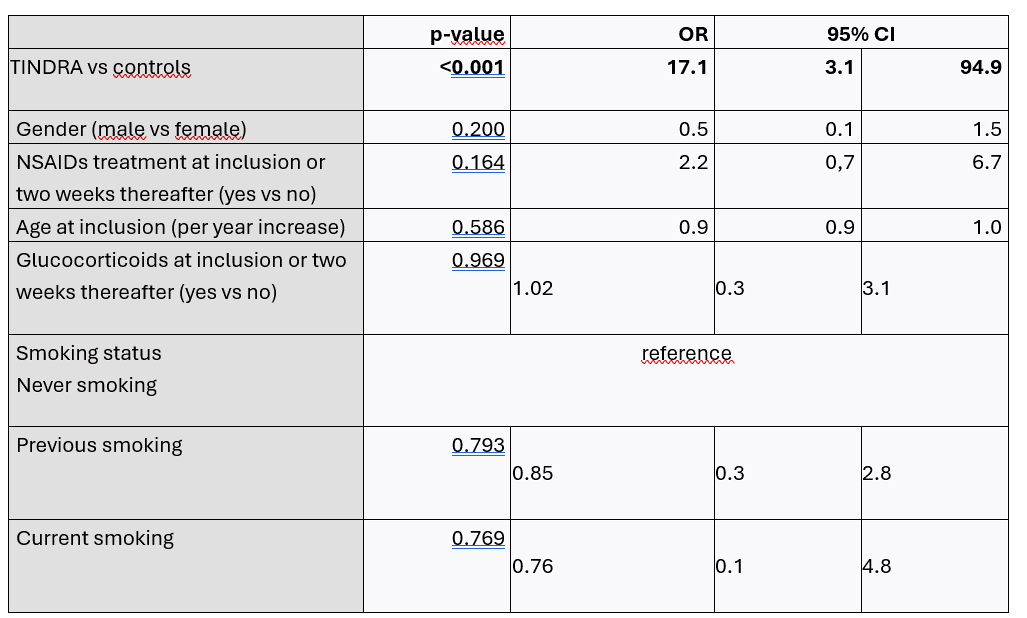Session Information
Session Type: Poster Session B
Session Time: 10:30AM-12:30PM
Background/Purpose: Alterations in gut microbiota (dysbiosis) may contribute to the development of rheumatoid arthritis (RA). Elevated fecal calprotectin (F-calprotectin), an established biomarker of gut inflammation, has been shown to associate with dysbiosis in patients with inflammatory bowel disease (IBD), and may reflect microbiota alterations also in RA (1).
The aim was to explore levels of F-calprotectin in patients with new-onset RA without symptoms indicating comorbid IBD, and how this is linked to disease activity.
Methods: Patients with new-onset RA, participating in the “tight control” and “treat to target” strategy in RA study (TINDRA) at the Department of Rheumatology, Skåne University Hospital (n=104), and a control group without rheumatic disease/IBD (n=50), were enrolled. Fecal samples were obtained at inclusion (at RA diagnosis or within a few weeks thereafter (n=77) and at 6 months follow-up visit (n=30) in patients, and on one occasion in controls (n=50). F-calprotectin was analyzed using ELISA, where levels ≥50 µg/g stool indicate gut inflammation (2).
Results: RA patients were: 73% women, had a mean age of 58 years and symptom duration of 6 months at diagnosis; 51% were current/previous smokers, 24% reported NSAID use, 58% had started treatment with systemic glucocorticoids (GCs) and 22% with methotrexate when baseline fecal samples were obtained. Corresponding data among controls were: 48% women, mean age 50 years, 28% current/previous smokers and 47% using NSAIDs. Mean (range) F-calprotectin at inclusion was significantly higher in patients: 71 (23-559) vs 17 (1-138) µg/g in controls (p< 0.001, Mann-Whitney U-test). The proportion of individuals with elevated values (≥50 µg/g) was significantly higher among patients (36% vs 4%, p< 0.001, Chi2-test). Among patients, higher DAS28, higher DAS28CRP, and usage of NSAIDs at inclusion were associated with increased F-calprotectin levels (p=0.043, p=0.026 and p=0.013, respectively; Spearman correlation). In addition, after adjustment for age, gender, NSAID use, and use of GCs, havig new-onset RA remained significantly associated with increased baseline F-calprotectin levels (logistic regression analysis, Table). Baseline F-calprotectin levels were associated with higher DAS28and DAS28CRP at 3 months follow up (p=0.030 and p=0.045, respectively) but not with DAS28 or DAS28CRP at 6-months follow-up (Spearman correlation). Compared to levels at inclusion, F-calprotectin decreased numerically at 6 months follow-up (mean 58; range 25-493).
Conclusion: Despite absence of IBD-like symptoms, patients with early RA displayed increased levels of F-calprotectin at diagnosis even after adjustment for age, gender, use of NSAIDs, systemic GCs and smoking status. F-calprotectin levels decreased numerically over a 6-month period in patients followed according to a “tight control” and “treat to target” strategy. These results indicate the presence of subclinical gut inflammation in early RA.
Ref.
1. Romero-Figueroa MDS, et al. Gut-joint axis: Gut dysbiosis can contribute to the onset of rheumatoid arthritis via multiple pathways. Front Cell Infect Microbiol. 2023 Jan 27;13:1092118.
2. Truedsson L. Klinisk Immunologi. Upplaga 1 (ISBN 978-91-44-07426-9)
To cite this abstract in AMA style:
Einarsson J, Friberger Pajalic K, Bengtsson C, Roseman C, Landgren E, Mogard E, Lindqvist E, Olofsson T, Karlsson Wallman J, C Kapetanovic M. Increased Levels of F-calprotectin in Patients with Early Rheumatoid Arthritis at Diagnosis [abstract]. Arthritis Rheumatol. 2024; 76 (suppl 9). https://acrabstracts.org/abstract/increased-levels-of-f-calprotectin-in-patients-with-early-rheumatoid-arthritis-at-diagnosis/. Accessed .« Back to ACR Convergence 2024
ACR Meeting Abstracts - https://acrabstracts.org/abstract/increased-levels-of-f-calprotectin-in-patients-with-early-rheumatoid-arthritis-at-diagnosis/

